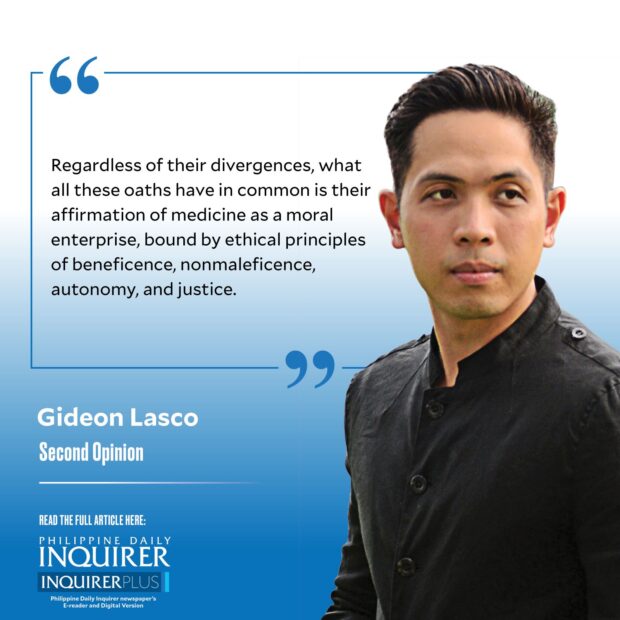Hippocrates beyond the oath

In medicine, Hippocrates of Kos (c. 460-370 BCE) is well-known because of the oath ascribed to him that physicians take before formally being recognized as licensed physicians. I still remember going to the Philippine International Convention Center for that oath-taking, which, after finishing five years of medical school and internship; four weeks of intense review, and four days of licensure exams, culminated in receiving the hard-earned Professional Regulation Commission card.
The oath itself is a fascinating subject for history of medicine, given how it has evolved through the years. In its original formulation, it contains arcane passages, such as “I will not cut, even for the stone, but I will leave such procedures to the practitioners of that craft” (a throwback to the time when surgery was not considered part of that particular medical tradition, and when surgical techniques were not yet fully developed) and “I will not give to a woman a pessary to cause abortion” (a much-debated sentence).
Various iterations and adaptations of the oath would be developed over the past century to reflect contemporary values. Internationally, the World Medical Association’s Declaration of Geneva—adopted in 1948 and amended most recently in 2017—was in line with post-World War II human rights discourse; in the United States, a widely adopted revision was penned in 1964 by Louis Lasagna, a clinical pharmacologist, in which a reference to abortion was removed and the allusion to euthanasia (“I will not give a lethal drug to anyone if I am asked, nor will I advise such a plan”) was replaced with the following lines:
“If it is given me to save a life, all thanks. But it may also be within my power to take a life; this awesome responsibility must be faced with great humbleness and awareness of my own frailty. Above all, I must not play at God.”
Back home, the Philippine Medical Association still uses a version of the oath that’s essentially the same as the original (“I swear by Apollo the Healer, by Aesculapius …”), reflecting the largely conservative disposition of our society and of our medical profession today. Notably, the Philippines is one of the 24 countries around the world that prohibit abortion in whatever form, and I wonder to what extent the medical profession has reinforced, not jut reflected, this position (see “Abortion: A not-so-hidden reality,” 6/10/22).
Regardless of their divergences, what all these oaths have in common is their affirmation of medicine as a moral enterprise, bound by ethical principles of beneficence, nonmaleficence, autonomy, and justice. Although the much-invoked phrase “primum non nocere (first do no harm)” does not actually appear in the oath, it does state “I will do no harm or injustice” to one’s patients.
Hippocrates was an exponent of humoral pathology, which saw humans as having four “humors” or vital fluids: blood, phlegm, black bile, and yellow bile, the imbalances of which cause illness. Such was the influence of this theory—which saw the environmental (e.g., init, lamig) as a major determinant of individual health. This view, espoused by physicians as late as Jose Rizal, may have long been rendered obsolete by germ theory, but, as I have been learning from professor Mark Schiefsky, a classicist and historian of science at Harvard, Hippocratic medical philosophy still offers valuable insights for public health.
Western medicine’s focus on pathogens, for instance, detracts from the Hippocratic attention to environment and nutrition, even as they are actually just as essential to patients’ health and well-being—as our experience with both communicable and noncommunicable diseases slow. As I have repeatedly argued in this space, green public spaces—from forests to urban parks—can do wonders for our health and well-being.
Hippocrates also saw prevention as better than cure, and emphasized both diet (“Let food be thy medicine …”) an active lifestyle (“Walking is man’s best medicine”)—the cornerstones of wellness then and now. Conversely, he warns against a sedentary lifestyle, as evidenced by his descriptions of the Scythians and his observation of the adverse effects of obesity in “On Airs, Waters, and Places.”
The Greek physician also offered important pointers for patient care. In “On Ancient Medicine,” to give one final example, he exhorts doctors to explain the diagnosis and treatment to their patients, a dictum so often lost among today’s practitioners, as Tsiompanou and Marketos (2013) translate him as saying:
“It is not easy for lay men to understand how illnesses appear and pass away and what causes them to get better or worse; but when someone else has discovered these things and explains them then it is easy.”
Two millennia and a half since Hippocrates, the wisdom and truths ascribed to him are as timeless as human experience: “Life is short, the art long, opportunity fleeting, experience treacherous, judgment difficult.”
—————-
glasco@inquirer.com.ph




















